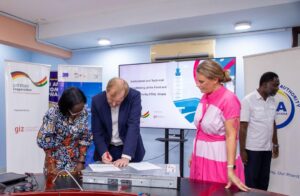By Mohammed AWAL
Government has announced a series of initiatives aimed at bolstering the country’s capacity to produce vaccines and essential drugs, positioning it as a future hub for medical manufacturing in Africa.
In line with this, the German Development Cooperation (GIZ) presented the Ghanaian Food and Drug Authority (FDA) with four servers to implement the ‘Integrated Regulatory Information Management System’ (IRIMS). This system digitalises FDA’s regulatory operations, including lot release for vaccine manufacturing, and allows clients to submit and track their applications online.
“With this new management system and additional technical equipment, our Ghanaian partners can continue working toward their objective of turning Ghana into a pharmaceutical producer,” says Wilhelm Hugo, Cluster Coordinator of the Deutsche Gesellschaft für Internationale Zusammenarbeit (GIZ), which is implementing the ‘Support to Strengthen the Institutional and Technical Capacities of the FDA’ project on behalf of the German Federal Government and EU.

To regulate vaccine production, the FDA must meet World Health Organisation (WHO) standards. These include a pharmaceutical-microbiological laboratory and a Clean Room, where contamination from dust, airborne germs, aerosol particles and chemical vapours is prevented.
“By November 2024 the FDA will have a Clean Room that meets specified biosafety standards. This effort underscores our commitment to building critical infrastructure to regulate locally produced vaccines for the ECOWAS region,” says Dr Delese Darko, CEO-FDA Ghana.
Wilhem Hugo adds: “We are optimistic that our Ghanaian partners will succeed in achieving their objective and thereby improve the health situation throughout West Africa. Additionally, the country will create jobs, generate taxes and dividends and promote sustainable and balanced economic growth”.
In a recent address, President Nana Akufo-Addo outlined the country’s ambitious plans to develop a robust pharmaceutical sector capable of meeting both local and international demand.

Key to these efforts is the establishment of a new state-of-the-art manufacturing facility in Accra, expected to be operational by 2025.
Already, the European Union member states jointly contributed nearly 55 million euros in 2023 to ensure that Ghana becomes a vaccine manufacturing hub in Africa. It has also commissioned a new solar power plant, supporting Ghana’s energy diversification in the Upper West, funded by Germany and built by Spain.










